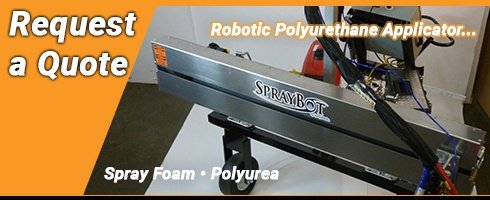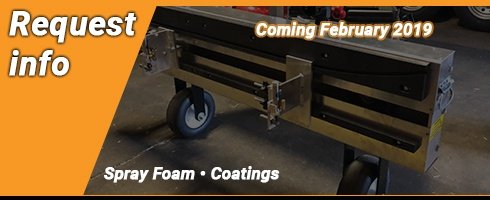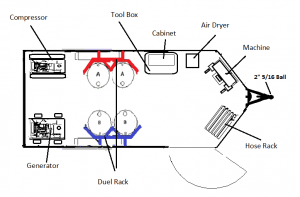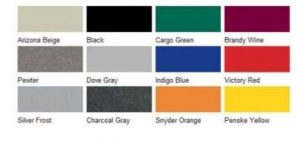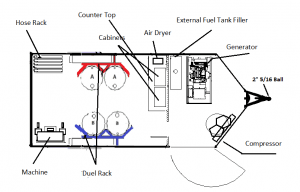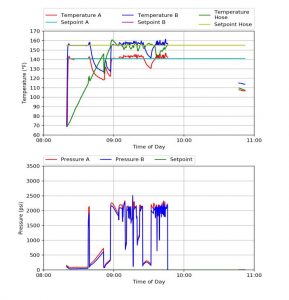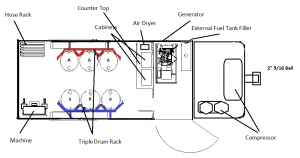Abrasion Resistance, Corrosion Protection, Waterproofing and more

The equipment used in the oil and gas industry is consistently subjected to many rigors. The industry has a wide span of operations which includes directing oil and gas to factories and drilling in the rough environment of the ocean. The persistent contact with harsh and abrasive factors both internally and externally requires that the operating equipment be able to stand up to the rigors while being able to optimally perform its required job.
To address the harsh treatment, piping and equipment required, coating material is required to prevent deterioration. Insufficient protection will result in quickly degraded equipment which will hinder operations resulting in lost revenue and potential mishaps that can be damaging to the environment, surrounding populations, and serve only to potentially damage a company’s reputation costing it thousands to repair.
LEARN HOW SPRAY FOAM IS USED IN THE OIL & GAS INDUSTRY
Over the last century, everything from paint, epoxy, vinyl esters, polyurea, and fiberglass have been used for coating protection, used across a wide spectrum of applications. Some have fallen out of favor due to lack of effectiveness, others are not cost-efficient, while some have been refined over decades and continue to be used effectively today.
High quality single component polyurea equipment is critical for this industry, especially in the underwater drilling sector, necessitating high-reliability levels and extensive longevity of products, with a high focus on performance. Coatings are an effective measure of providing both low function and high resistance to wear. The following are some of the inherent advantages of using quality coating materials in the oil and gas industry:
Abrasion Resistance
With the harsh materials and environment encountered constantly in the oil and gas industry, using parts and equipment that can withstand the rigors of these elements is paramount. By constantly processing abrasive elements, for extraction methods or drilling, equipment with insufficient protective coatings can quickly degrade mechanical equipment pivotal to industry operations. If the machines fail due to daily wear and tear, operations have to be altered or must cease altogether.
Corrosion Protection
Oil and gas operations occur largely either underground or underwater. In neither case, there is a lot of moisture introduced to the metal piping used in operations. The effects of moisture on metal in terms of promoting rust are well known, and pipeline corrosion leads to rusty equipment. Both lead to quick wear, breakdowns, inefficiency, as well as lost time and revenue, costing the industry billions in lost revenue annually. In that sense, corrosion prevention is an essential component of functioning industry equipment, with appropriately coated piping pivotal to performance success and corrosion prevention.
Waterproofing
Regular operation in underwater environments requires a significant level of protection against leaks as well as other water-based damage. When oil is extracted, for instance, having water enter the oil stream, or worse, having oil escape into the water, can result in at best, a compromised product, and at worst an environmental calamity. This is also an important aspect in valves, mechanisms responsible for the regulation of flows, shut-offs, and redirections of material traveling through the pipes. Waterproofing also implies protection via oil liners and containment liners from spills from piping of chemicals and other hazardous materials. Chemical spill protection liners are commonly used via internal coating to prevent such unwanted leaks.
Weather Proofing
It is a difficult enough business to work with deep-sea extractions, transporting environmentally hazardous materials through pipes. But environmental factors such as turbulent and extreme weather, temperature fluctuations, and potentially violent weather patterns add another difficult and unpredictable element to stable operations. Therefore, any piping and equipment must be equipped with a sturdy enough coating to withstand a serious beating from the elements in order to prevent damages. The oil and gas industry, due to the multiple mishaps over the last few decades is always governed closely. Coatings provide extra assurances that even impossible to control weather elements will not result in small or large-scale environmental disasters, leading to potential financial and legal consequences within the industry.
Structural Support
Metal is strong, but insulated metal coated with appropriate materials affords extra structural stability reinforcing the already powerful material. As noted earlier, corrosion is a big factor in speeding up the decomposition of equipment under constant exposure to various liquids, many of a chemical nature. While oil is not a corrosive element on its own, the minerals from groundwater still affect the integrity of equipment and piping, compromising the strength and structural build of pieces of equipment. Maintenance and reapplication of coating materials periodically stave off those effects and reinforces the structural integrity of piping and equipment even under the most intense conditions.
The properties of great coating materials (adhesion, low friction, and hardness make the use of coating materials particularly important in the industry that is as rigorous as the operating conditions and the nature of the oil and gas industry, promoting maximum safety, defense, and structural support even under the harshest environmental conditions.
Flow enhancement / assurance
Friction, turbulence and fluid viscosities all affect the flow of products through a pipeline.
Fluid flow efficiency is vital for keeping pipelines clean including elbows, unions and fittings. This can minimize buildup and the number of shutdowns for cleanup or replacement.
Manufacturing / Installation
Industrial pipe coating can be manufactured in plant or field applied and each environment presents its own difficulties and benefits. The importance of choosing the right coating for environment, use, and substrate, and having the application overseen by professionals cannot be overstated. For more information on equipment and training contact us.

